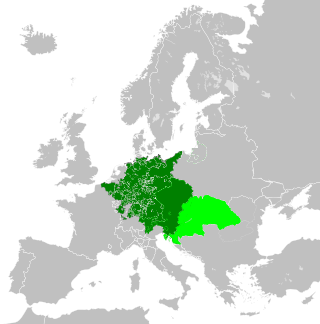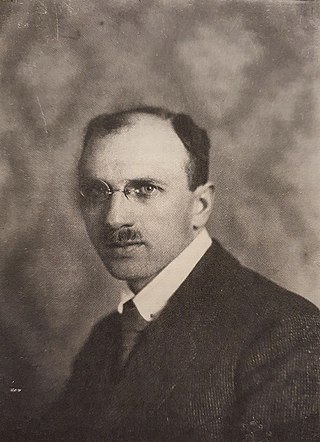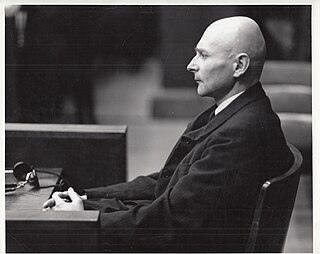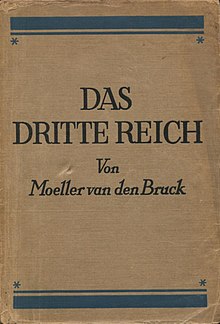
Reich is a German word whose meaning is analogous to the English word "realm"; this is not to be confused with the German adjective "reich" which means "rich". The terms Kaiserreich and Königreich are respectively used in German in reference to empires and kingdoms. The Cambridge Advanced Learner's Dictionary indicates that in English usage, the term "Third Reich" refers to "Germany during the period of Nazi control from 1933 to 1945".
German Reich was the constitutional name for the German nation state that existed from 18 January 1871 to 5 June 1945. The Reich became understood as deriving its authority and sovereignty entirely from a continuing unitary German Volk, with that authority and sovereignty being exercised at any one time over a unitary German "state territory" with variable boundaries and extent. Although commonly translated as "German Empire", the word Reich here better translates as "realm" or territorial "reach", in that the term does not in itself have monarchical connotations.

Ernst Niekisch was a German writer and politician. Initially a member of the Social Democratic Party (SPD) and of the Alte Sozialdemokratische Partei (ASP), he later became a prominent exponent of the National revolutionary branch of the Conservative Revolution and National Bolshevism.
The Conservative Revolution, also known as the German neoconservative movement, or new nationalism, was a German national conservative movement prominent during the Weimar Republic and Austria, in the years 1918–1933.

Friedrich Julius Stahl was a German constitutional lawyer, political philosopher and politician.
The Fourth Reich is a hypothetical Nazi Reich that is the successor to Adolf Hitler's Third Reich (1933–1945). The term has been used to refer to the possible resurgence of Nazi ideas, as well as pejoratively by political opponents.
Klaus Hildebrand is a German liberal-conservative historian whose area of expertise is 19th–20th-century German political and military history.

Friedrich David Gilly was a German architect and the son of the architect David Gilly. His works are influenced by revolutionary architecture (Revolutionsarchitektur). Born in Altdamm, Pomerania,, Gilly was known as a prodigy and the teacher of the young Karl Friedrich Schinkel.
The Völkisch Ideology and the Roots of Nazism: The Early Writings of Arthur Moeller van den Bruck is a book by Paul Harrison Silfen. It was published in New York City by Exposition Press in 1973 as an 85-page hardcover (ISBN 0682477869).
Klaus Scholder was a German ecclesiastical historian, professor of history at the University of Tübingen.

Friedrich Hielscher was a German intellectual involved in the Conservative Revolutionary movement during the Weimar Republic and in the German resistance during the Nazi era. He was the founder of an esoteric or Neopagan movement, the Unabhängige Freikirche, which he headed from 1933 until his death.
Neue Rechte is the designation for a right-wing political movement in Germany. It was founded as an opposition to the New Left generation of the 1960s. Its intellectually oriented proponents distance themselves from Old Right Nazi traditions and emphasize similarities between the far-right and the conservative spectrum.

Das Dritte Reich is a 1923 book by the German author Arthur Moeller van den Bruck, whose ideology heavily influenced the Nazi Party. The book formulated an "ideal" of national empowerment, which found many adherents in a Germany desperate to rebound from the Treaty of Versailles.

Hermann Ehlers was a German politician. He was the second president of the Bundestag from 19 October 1950 to 29 October 1954.
Third Empire may refer to:

Johannes Schlaf was a German playwright, author, and translator and an important exponent of Naturalism. As a translator he was important for exposing the German-speaking world to the works of Walt Whitman, Émile Verhaeren and Émile Zola and is known as a founder of the "Whitman Cult" in Germany. His literary achievements lie foremost in the scenic-dialogue innovations of "sequential naturalism" and in the formalization of literary impressionism. He also contributed to the emergence of the "intimate theater."

Götz Kubitschek is a German publisher, journalist and far-right political activist. He espouses ethnocentric positions and is one of the most important protagonists of the Neue Rechte in Germany. Hailing from the staff of right-wing newspaper Junge Freiheit, Kubitschek is one of the founders of the Neue Rechte think tank Institut für Staatspolitik. Since 2002, he is the manager of his self-founded publishing house Antaios, since 2003 chief editor of the journal Sezession, as well as editor of the corresponding blog Sezession im Netz.
Agrarian conservatism in Germany was a type of conservatism that began to wane in popularity prior to the rise of the Nazi Party.

The Anti-Bolshevist League, later the League for the Protection of German Culture, was a short-lived German far-right organization that initially opposed the November Revolution and later most notably the Spartacus League. It was founded in early December 1918 by the young conservative and ultra-nationalist publicist Eduard Stadtler. The organization was financed by large industrialists, bankers as well as former representatives of the German aristocracy.

Volker Weiss is a German historian, writer, and commentator on extreme right movements. His research focus is the extreme right and German history in the 19th and 20th century. Volker Weiss is a Fellow of the Center for Research on Antisemitism in Berlin.













